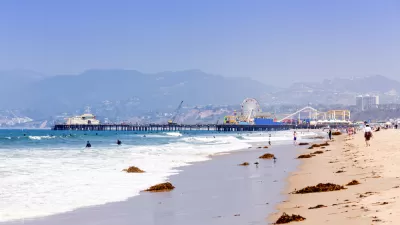Actor Leonardo DiCaprio is also a committed climate change activist. His documentary on the topic airs Oct. 30 on the National Geographic channel. At the U.N., he asked leaders to take bold action. Yet, as an Angeleno, he opposes increased density.

In September 2014, Leonardo DiCaprio was designated a UN Messenger of Peace with a special focus on climate change, Earlier this month at the White House, "he premiered his new documentary, Before the Flood, where DiCaprio travels the world, witnessing the devastating effects of climate change: dramatic sea-level rise, deadlier storms, and longer and more devastating droughts," writes Alissa Walker for Curbed Los Angeles.
"This is the most important issue of our time," he says in the film, as he stands before the United Nations, calling on leaders to take "bold, unprecedented action." The documentary explores the connection between political will and personal decisions.
A few weeks earlier, DiCaprio’s name had made headlines for another reason. He was listed as one of several "concerned Angelenos" endorsing the Neighborhood Integrity Initiative, a ballot measure that would cripple LA’s efforts to grow denser and more vertical. The initiative grew out of opposition to taller buildings and transit-oriented development in Hollywood.
The initiative, which was to appear on the City of Los Angeles' ballot next month, was pulled back and will be placed on the March 2017 ballot.
Walker details the connection between increased density and reduction of carbon emissions, describing how both the Los Angeles initiative and Santa Monica's anti-density measure, would exacerbate emissions by restricting density.
She makes an impassioned case as to why climate activists should support increasing density, particularly in a city like Los Angeles, which "as one of the largest cities on Earth area-wise, with a statistically heavy reliance on single-passenger vehicles, could absolutely have an outsize impact on keeping the world’s temperatures below that 2 degree point of no return..."
However, Walker doesn't explain why climate activists oppose increasing urban density. In looking at Preserve LA's argument in support of the measure in which DiCaprio and other celebrities are cited, nothing is mentioned about climate change. Rather, neighborhood character is more of an issue, hardly the "defining crisis of our time," the term DiCaprio uses to describe climate change.
- Los Angeles' Contentious 'Neighborhood Integrity Initiative' Explained, February 3, 2016
Hat tip to LA Metro Headlines.
FULL STORY: Attention Leonardo DiCaprio: LA's anti-density movement is bad for the environment

Planetizen Federal Action Tracker
A weekly monitor of how Trump’s orders and actions are impacting planners and planning in America.

Congressman Proposes Bill to Rename DC Metro “Trump Train”
The Make Autorail Great Again Act would withhold federal funding to the system until the Washington Metropolitan Area Transit Authority (WMATA), rebrands as the Washington Metropolitan Authority for Greater Access (WMAGA).

DARTSpace Platform Streamlines Dallas TOD Application Process
The Dallas transit agency hopes a shorter permitting timeline will boost transit-oriented development around rail stations.

New Jersey Duplexes Elicit Mixed Reactions
Modern, two-unit residences are proliferating in northern New Jersey communities, signaling for some a boon to the housing supply and to others a loss of historic architecture.

Renters Now Outnumber Homeowners in Over 200 US Suburbs
High housing costs in city centers and the new-found flexibility offered by remote work are pushing more renters to suburban areas.

The Tiny, Adorable $7,000 Car Turning Japan Onto EVs
The single seat Mibot charges from a regular plug as quickly as an iPad, and is about half the price of an average EV.
Urban Design for Planners 1: Software Tools
This six-course series explores essential urban design concepts using open source software and equips planners with the tools they need to participate fully in the urban design process.
Planning for Universal Design
Learn the tools for implementing Universal Design in planning regulations.
Municipality of Princeton
Roanoke Valley-Alleghany Regional Commission
City of Mt Shasta
City of Camden Redevelopment Agency
City of Astoria
Transportation Research & Education Center (TREC) at Portland State University
US High Speed Rail Association
City of Camden Redevelopment Agency
Municipality of Princeton (NJ)




























